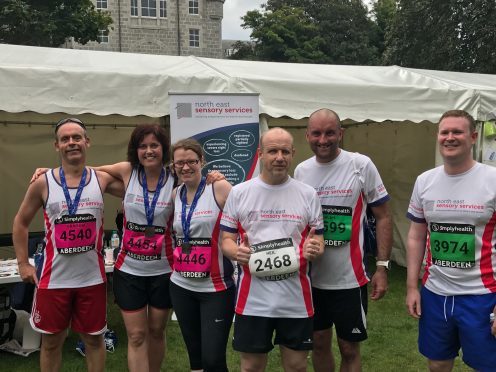September is here already and I completed my first ever Aberdeen half marathon.
In general my training went well – apart from a minor mishap a couple of weeks ago.
Believe it or not, I met my running pals and was all ready to set off when I noticed that I had amazingly managed to forget my rope, which is probably the most important part when you are being guided (apart from the guide of course!)
Luckily we meet at a sports centre so with a bit of thought and some improvisation, a new makeshift rope was designed. I was informed that a sports bra and some elastic were used, but I didn’t ask where or how both items had been acquired.
That aside the first ever Simplyhealth Great Aberdeen event was a sell-out.
NESS had 44 runners participating, so it was a huge success for charities as well as bringing lots of people into the town centre where there really was a fantastic atmosphere.
I also delivered my first after-dinner style wedding address in August, which was great fun and something completely different.
It is always interesting to me to see how nervous and uncomfortable people get if they use the ‘see’ word to me, it is as if they have greatly offended me by using it.
Now if you think about it, it would be strange to say to colleagues every night when leaving work, “hear you tomorrow”. How silly does that sound?
When discussing TV programmes or a movie, you’d never think of saying “have you heard…” nor “did you listen to the football last night”. Words like ‘see’, ‘watch’ and ‘seen’ are everyday language and are in no way offensive.
Many blind people enjoy television or go to the movies and audio description can really make these come to life.
Put simply, audio description is a commentary which runs alongside the programme or film telling you what’s happening on screen. For example, “Two men running along the street with a very peculiar piece of rope tethering them together at the wrist…”
